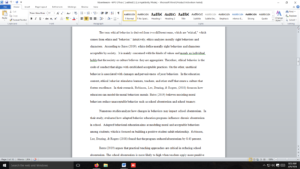Ethical behavior
For your assignment this week, you will write 5–8 page paper, including a literature review, that examines ethical behavior, diversity, and civil discourse in the context of your particular focus and specialization.
School absenteesim is the focus and specilization
Overview
Ethical behavior, diversity, and civil discourse are subjects not easily defined for study. We can point to perceived differences between people and cultures; however, that is only the tip of the proverbial iceberg, ignoring the effects of those differences in a given context. Additionally, focus on ethical behavior, diversity, and civil discourse usually requires value comparisons and judgments, rather than a one side versus the other approach. For additional information on these concepts and how they tie into the assignment, see the Week 7 Assignment Background Information [PDF] document.
In the context of the field of education, the effects of ethical behavior, diversity, and civil discourse on individuals and organizations are impossible to ignore. The challenges of adopting a broad view of difference and creating an equitable learning experience for all whom we lead are many, and they are not easily met. However, the professional literature of the field is a rich resource of tools, research, and practical experience and application.
For this assignment, you will review the literature related to ethical behavior, diversity, and civil discourse in the context of your particular focus and specialization and choose one main concern for each of these domains to analyze in the literature review section of your paper. You will apply the skills you started building in the Literature Review assignment in Week 5. Similar to what you did previously, but focused now on the challenges relevant to these domains and inherent to your specialization, you will research and review scholarly, peer-reviewed literature. Going one step further, you will then choose and explain the main challenges in your specialization, as suggested by your review. Note that you are writing a condensed literature review for this assignment.
Reminder: Writing a literature review is a key part of academic work. A literature review is a piece of writing that describes what has been learned about a topic through previous research efforts. A literature review is essentially a report on work previously done in a field, to show an understanding of the context for your own writing. A literature review is not a summary of individual sources in a list, such as in the form of an annotated bibliography. Rather, the literature review paraphrases the findings from the scholarly readings you selected. You will seek the key themes from the different sources, and you will use in-text citations to support the information you learned from the scholarly readings.
See Section 6.11 of the APA Manual for additional detail on citing sources in text. Also refer to Academic Writer for guidance on using proper APA style. See the APA Style and Format section of the Writing Center for instructions on accessing and using Academic Writer.
Competencies Measured
By successfully completing this assignment, you will demonstrate your proficiency in the following course competencies:
- Competency 1: Determine how action research and systems thinking apply to professional problems, challenges, or issues in education.
- Evaluate challenges posed by issues of ethical behavior, diversity, and civil discourse to a given educational specialization.
- Competency 2: Apply information literacy skills to locate and critically evaluate scholarly data, theories, and research.
- Analyze scholarly literature focused on the connections among issues of ethical behavior, diversity, and civil discourse and a given educational specialization.
- Support arguments with reference to scholarly literature.
- Competency 4: Analyze the characteristics of ethical behavior and respect for diversity and civil discourse.
- Describe connections among issues of ethical behavior, diversity, and civil discourse and a given educational specialization.
- Competency 5: Apply scholarly writing skills.
- Organize content so ideas flow logically with smooth transitions.
Reference
American Psychological Association. (2010). Publication manual of the American Psychological Association (6th ed.). Washington, DC: Author.
Competencies Measured
By successfully completing this assignment, you will demonstrate your proficiency in the following course competencies:
- Competency 1: Determine how action research and systems thinking apply to professional problems, challenges, or issues in education.
- Evaluate challenges posed by issues of ethical behavior, diversity, and civil discourse to a given educational specialization.
- Competency 2: Apply information literacy skills to locate and critically evaluate scholarly data, theories, and research.
- Analyze scholarly literature focused on the connections among issues of ethical behavior, diversity, and civil discourse and a given educational specialization.
- Support arguments with reference to scholarly literature.
- Competency 4: Analyze the characteristics of ethical behavior and respect for diversity and civil discourse.
- Describe connections among issues of ethical behavior, diversity, and civil discourse and a given educational specialization.
- Competency 5: Apply scholarly writing skills.
- Organize content so ideas flow logically with smooth transitions.
Reference
Answer preview
The term ethical behavior is derived from two different terms, which are “ethical,” which comes from ethics and “behavior.” Intuitively, ethics analyzes morally right behaviors and characters. According to Bates (2019), ethics define morally right behaviors and characters acceptable by society. It is mainly concerned with the kinds of values and morals an individual holds that the society or culture believes they are appropriate. Therefore, ethical behavior is the code of conduct that aligns with established acceptable practices. On the other, unethical behavior is associated with damages and pervasiveness of poor behaviors. In the education context, ethical behavior stimulates learners, teachers, and other staff that create a culture that fosters excellence. In their research, Robinson, Lee, Dearing, & Rogers, (2018) focus on how educators can model the moral behaviors morals. Bates (2019) believes modeling moral behaviors reduce unacceptable behavior such as school absenteeism and school truancy.
[1954 Words]
Ethical behavior


